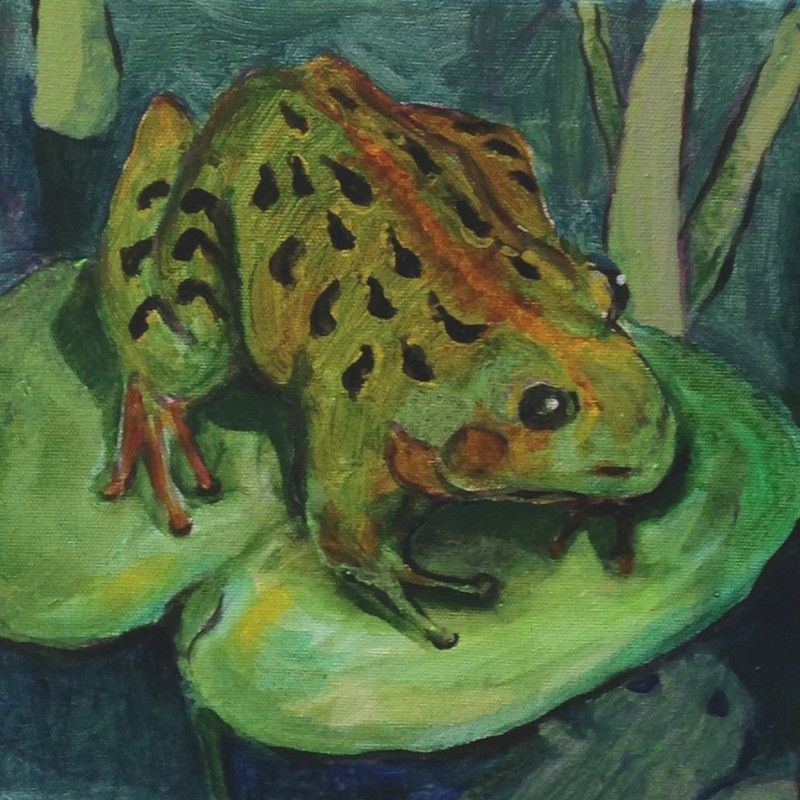is really our problem. Too many books have been published, repeating the “sweet-sweet-sweet, twitter, twitter,” mantra, so we are conditioned to think that any variation on the theme is an error. After all, it’s there printed in the book and if it’s in a book it must be true, right? But does this sparrow have a problem or is he just singing variations on a theme? As far as I can tell, and judging by the enthusiasm and quality of the vocalisation, our feathered friend is on top of the world.
The peepers down at the pond make my heart leap up with the exuberance of their song in the evening and on into the night. How can something that small contrive to make the volume of exultant joy that peepers seem to find quite unexceptional? But they do. Every evening, before the light has died out of the sky in the west, the peepers are up and doing and prepared to carry on in this joyous manner for hours. And the peepers are not alone. Every spring, along somewhere in April, our amphibian chorus begins tuning up. First come the wood frogs with their funny gabble, like a bunch of excited people just emerging from some event in which the right team won. The field is not theirs for very long, however, because the peepers with their high-pitched peeping arrive not long after and rather drown out the lower-pitched gabble. The gabble carries on for some weeks, though, and emerges from the background now and again as the peepers pause to take breath. Their song may not always be available to our ears but then we are not the destined recipients. We are only the fortunate bystanders, blessed by inadvertence. Somewhere along as spring advances and retreats, nature seems to have forgotten about us, and then comes rushing back to fool us into thinking we live a thousand miles further south than we do, and generally does a dance of seven veils - and the toads arrive. I always find myself feeling slightly uneasy, when I come to talk about the toads. Toads don’t get very good press. They look fat and squat and dull. Unlike their froggy cousins they are not high steppers. They move along in lumpy hops without the grace that frogs display. Their skin looks dry and warty, not sleek and green. I remember being told, as a child, that if I touched a toad I would get warts. Being the sort of child I was, I put the warning to the test - and learned, yet again, not to trust everything that proclaims itself to be true. But the dumpy toad with the unappealing broad mouth set in a permanent grumpy expression, has its beauty too, if one pauses to look closely. Toads do most of their hunting in low light and their eyes are well-adapted to gather all the light that is available, with the result that their eyes are large and beautiful. So what does it matter that the Latin name for a toad was Bufo, and somewhere along the way (it is said) the lowly toad gave his name to a clownish, stupid person, a buffoon. I don’t often see a toad, although they are around here, doing good work slurping up unwary insects, and in the spring, about the time the wood frogs have decided that the party is over, even though the news hasn’t reached the peepers, one evening, from back in the woods, comes the long, deep, quiet humming, rising and falling in volume, of the toads. When I first identified it I thought the sound rather uncanny, mysterious. I’ve gotten to know it as the ground bass of the amphibian orchestra. Until we moved here I knew no more of the spring chorus of frogs and toads than I knew of milking a cow. The latter all of us learned to do, and could do again. But our days of keeping a cow are behind us now; for the best but not without some regret. Friends have passed away and a simpler world that seemed unchangeable has vanished too. Life itself seems much more fragile than it used to. But the frogs and toads, ignoring disaster, still - thank goodness! - celebrate this fragile thing we call life. |
Words & ImagesWe moved to our farm in Sussex, New Brunswick from Toronto in 1977, only moving away in 2014. Archives
April 2020
Categories
All
|

